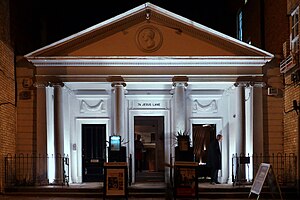Pitt Club

The façade of the Pitt Club
|
|
| Motto | Benigno numine – 'By the favour of the heavens' (Horace) |
|---|---|
| Formation | 1835 |
| Type | Dining club |
| Headquarters | 7a Jesus Lane |
| Location | |
| Coordinates | 52°12′30″N 0°07′11″E / 52.20824°N 0.11966°ECoordinates: 52°12′30″N 0°07′11″E / 52.20824°N 0.11966°E |
| Website | universitypittclub |
| Remarks | Grade II listed building |
The University Pitt Club, popularly referred to as the Pitt Club, the UPC, or merely as Club, is a private members' club. Membership is open only to male students at the University of Cambridge. Membership is for life.
The Pitt Club was founded in Michaelmas term 1835 and named in honour of William Pitt the Younger, who had been a student at Pembroke College, Cambridge. It was originally founded as a political club, 'to do honour to the name and memory of Mr William Pitt, to uphold in general the political principles for which he stood, and in particular to assist the local party organizations of the town of Cambridge to return worthy, that is to say, Tory, representatives to Parliament and to the Borough Council'. From the start, however, there was a social element as the Club's political events were combined with 'the pleasures of social intercourse at dinner, when party fervour among friends, dining in party uniform, might be warmed towards a political incandescence by the speeches to successive toasts'.
Over the course of the Pitt Club's first few decades, the political element diminished whilst the social element increased. By '1868, at the latest, the Pitt Club [had] ceased from all political activity and . . . elected members to its social advantages without any regards whatever to considerations of political party'. Though the Club's raison d'être changed in its early years, it 'was from the first, and has always remained, an undergraduate organization'.
The Pitt Club has been in almost continuous operation since its founding. During the First World War, however, the Club's existence became increasingly tenuous as more Cambridge men joined the forces. It temporarily closed in October 1917 but reopened in early 1919. By 1920, the Club had 'become nearly normal again, "the only real trouble", according to the Minutes, "being the horrible scarcity of whisky'".
The premises were commandeered during the Second World War and made available to the public. One observer, A. S. F. Gow, remarked at the time that the Pitt Club's 'eponymous hero looks down from the pediment, with a nose visibly tiptilted in disgust, upon an enormous notice displaying the legend "British Restaurant"'. As for the members, they were forced to seek alternative accommodation and eventually settled for temporary rooms above the post office in Trinity Street, which they called the Interim Club.
...
Wikipedia
